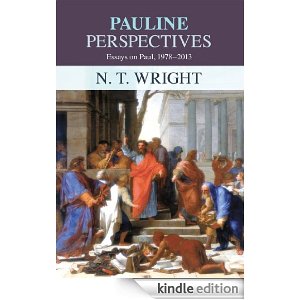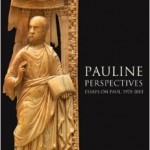BEN: Another major theme in several of these essays is justification, a subject which you have written a full book on, reviewed on this blog some years ago. Here I would like to ask— How has your mind changed over the years, or stayed the same, on this subject, if it has? If there is a constant thread for you in your thinking through this issue over thirty-five years what is it? Can you summarize for us how your view on the righteousness of God is similar to, or differs from the classic formulations on this subject by Luther and Calvin? How do you view the relationship between positional right standing with God and actually being righteous or holy in some sense? Another way of asking this is– How do you view the relationship between what has been called Justification and what is called the New Birth?
——
TOM: First, I had been suspicious for a long time of anything that seemed to be saying that ‘faith’ was ‘the right kind of religion’ (as opposed to ‘works’ which was ‘the wrong kind’) or ‘the kind of righteousness God wanted/approved’. I had heard that said many, many times and it never sounded right – and never made sense of the key texts. OK, that was a low-grade view, though some quite distinguished expositors used to say it. So I had always been disposed to a more Calvinist account: that faith, itself the gift of God, is our response to God’s grace and mercy rather than being ‘the thing we do to pin our flag on God’s map’. This is where, for instance, Richard Hays and I were always close, leading him to push hard for pistis Christou to refer to the faithfulness of Christ, to which our faith is a response. (Many other variations on this now abound, of course.)
I reacted against some earlier statements of the ‘subjective genitive’ (that of A. T. Hanson for instance), but am fully persuaded that at least in the line of thought from Romans 3.1-2 to Romans 3.21-22 the key thing is the unfaithfulness of Israel to the divine plan and the faithfulness of the Messiah, as Israel’s representative, to that same plan.
One breakthrough for me was when my teacher, George Caird, reviewed Sanders’s Paul and Palestinian Judaism, and mentioned the fourfold meaning of ‘God’s righteousness’ in the OT – that it’s the ‘righteousness’ of the judge in the lawcourt. I had in any case been reading Kaesemann’s commentary on Romans where he argues, against Bultmann, that God’s righteousness is God’s own righteousness, not the status which, whether from God or before God or anything else, is given/imputed/imparted to humans. My own combination of K’s rejection of B, and Caird’s exposition of the OT view, all coming together within a covenantal frame which K explicitly rejected and C never quite embraced, has been so exegetically fruitful – notably of course in Romans 3 and 9-10 – that I have seen no reason to change it.
What has developed, slowly but surely, is a sense of the integration of Paul’s exposition of justification with two other major features: first, the work of the Spirit (prominent in Gal 3—4, not in Rom 3—4, but when Paul restates justification in Rom 8.31-39 it is as a result of the whole Spirit-driven theme of ch 8); second, the ‘in Christ’ motif (see how, in Rom. 3.24, Gal. 2.17 and Phil 3.9, Paul can speak easily and naturally of being ‘justified in Christ’).
This cuts clean against the still-popular assumption, based on an atomizing reading of Romans (for which an older quasi-Lutheran reading must take the blame by its privileging of Rom 1-4 against 5-8 let alone 9-11), that ‘juristic’ and ‘participatory’ categories are different kinds of things which Paul never mixes and which must be played off against one another – Douglas Campbell’s massive and brilliant but to my mind utterly mistaken thesis being the most recent example. Galatians 2.12—4.11 shows that the two go completely together, as does Philippians 3.2-11; and a reading of Romans which takes seriously the entire sweep of the argument from 1.18 through to 8.39, not to mention the end of 11, demonstrates that ‘in the Messiah’ and ‘justification’ etc go together extremely closely. Far too many expositions of justification have tried to say everything that has to be said while leaving the Spirit out of it, and/or while pushing ‘in Christ’ language to one side. It can’t be done – or at least, it can’t be done by anyone wanting to be faithful to Paul.
In all this I have constantly been encouraged by reading more and more about the way that second-temple Jews were actually thinking, and were reading their scriptures.
The big thing to get across now, I think, is that the question ‘who then are the true family of Abraham’ and ‘how do I get my sins forgiven’ are not ultimately different questions. God called Abraham to undo the sin of Adam, so that to belong to Abraham’s family (Rom 4, Gal 3) is to be part of the family whose sins have been dealt with on the cross. Splitting these two themes apart, I now see in my old age, is the direct result of several false antitheses that have bedeviled western theology for long enough.
I think what I have learned through much of this is that a good many Protestants have forgotten that the primary thing Luther and Calvin did was to study and teach the scriptures, deliberately trying to generate a church that would go on doing the same rather than make their teachings into a new formal tradition against which scripture itself would have to be measured. The fact that some early varieties of the so-called ‘new perspective’, particularly of course that of Ed Sanders, were studying ‘patterns of religion’ rather than theology, particularly sociology, has provided an excuse for an unthinking backlash which has been even more unfortunate in its tone than in its content. Sadly, much Protestantism, of various sorts, has still clung to the view that since Paul’s gospel rejects a supposedly Jewish notion of ‘justification by works’, it must be opposed to Judaism itself and everything to do with it. That way lies Marcionism, of course.
That’s why, in much evangelicalism, the Old Testament is reduced to a book of types and patterns, lessons we can scoop up and transplant to our own day. It has thousands of those, of course, and we can learn from them. But the much bigger thing is the single story from Abraham to Jesus – NOT a smooth development or a steady crescendo but a dark and stormy passage with the sudden shaft of gospel light coming ‘when the time had fully come’ (Gal 4.4). All this needs a lot of spelling out still, but I hope I have pointed the way . . .
PS. Justification and ‘new birth’. The only Pauline reference to the latter is in Titus 3.5, in a rich and dense context which contains almost everything else you could wish, so there’s really too much information for us to say ‘this is how Paul related justification to new birth’. What Paul does more regularly talk about is the powerful work of God, through the spirit, in the preaching of the gospel: folly to Greeks, a scandal to Jews, but to us who are being saved, Christ the power of God and the wisdom of God. So it looks as though he has a strong theology of the announcement of the word of the gospel (either: the Messiah died for our sins according to the scriptures… etc etc as in 1 Cor 15.3; or ‘the crucified and risen Jesus is Lord’, as in Rom. 1.3-5; or some combination!); when this message is announced, even though it makes no sense in the worlds of the hearers, the Holy Spirit works through it and people come to believe that Jesus is Lord and that God has raised him from the dead (Romans 10). When that happens, Paul declares – or rather God declares – that people who believe this are thereby marked out as the sin-forgiven new-covenant family he always promised to Abraham. This causes all sorts of further questions, of course, but that’s I think how Paul puts the package together.














